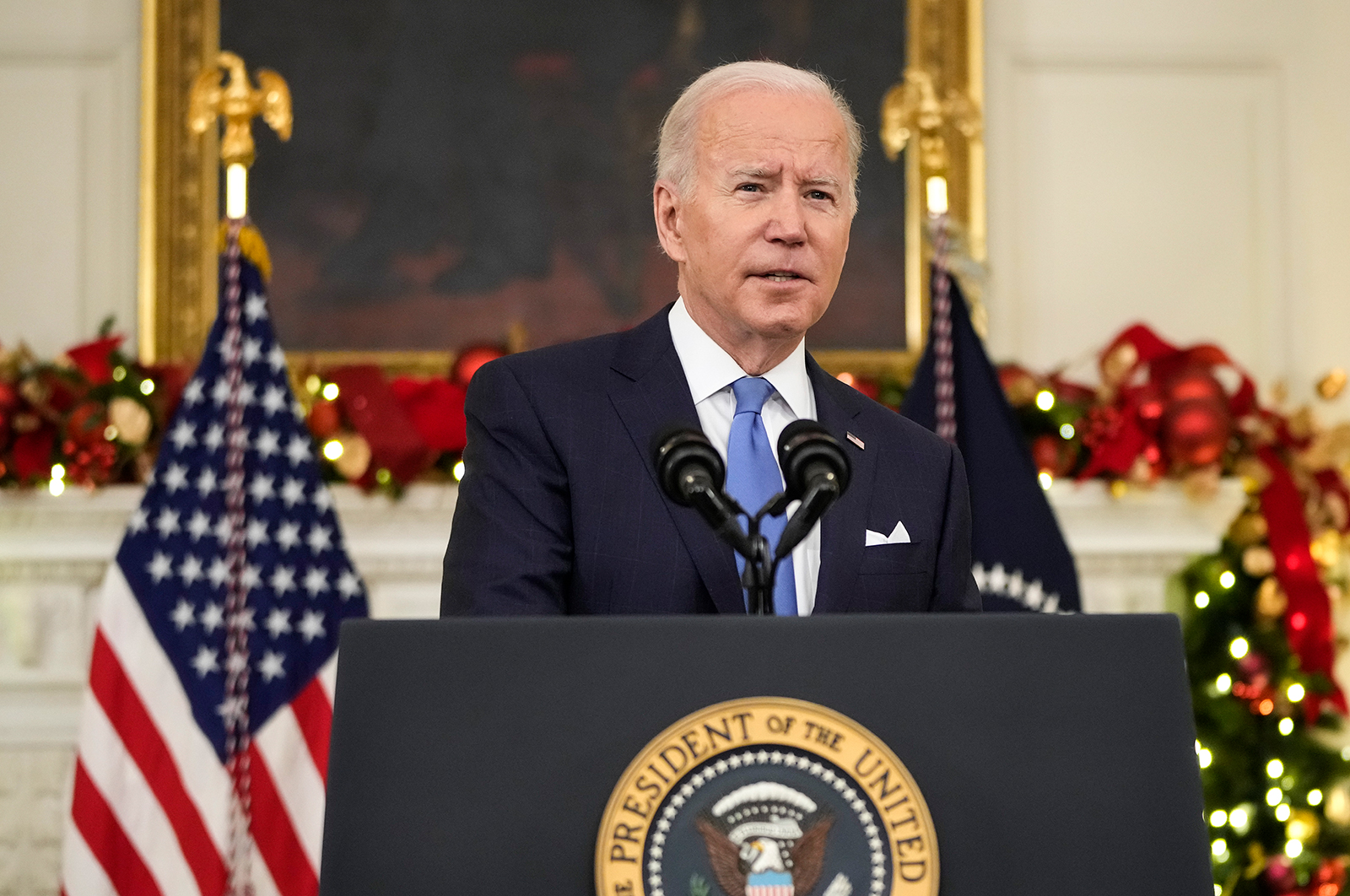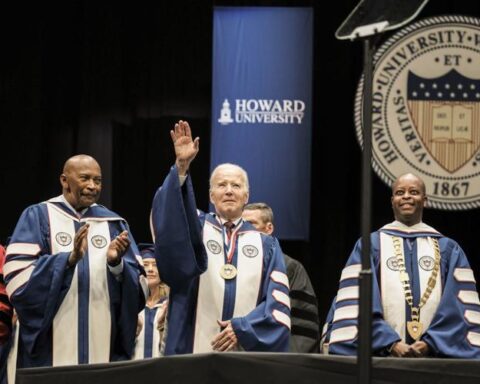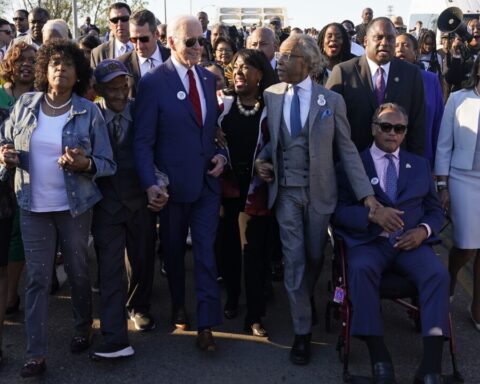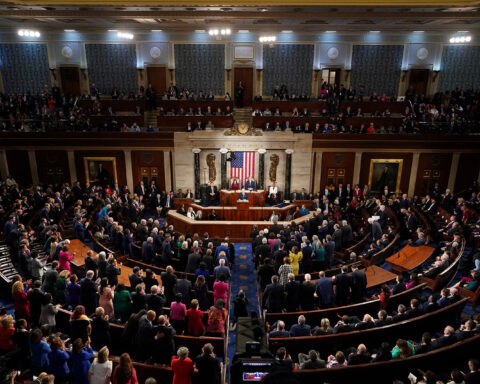President Joe Biden will return to the White House from an abbreviated winter break facing a set of hurdles that will test his political, diplomatic and management skills at a trying moment for his presidency.
The raging pandemic, a crisis with Russia and uncertainty surrounding his prized domestic priorities all await Biden in the new year. Determined to reset after a series of struggles — and to recalibrate expectations that some of his allies believe were unrealistic — the President is hopeful the coming weeks can provide much-needed momentum as another election cycle dawns.
Biden spent much of his time away from Washington over the past week on the phone discussing the days ahead with advisers and others in his extended orbit, plotting next steps in what could prove a pivotal month for his presidential ambitions. That includes preparation for a speech marking next week’s one-year anniversary of the January 6 Capitol riot, a moment that underscores the stakes of his tenure and the strained political environment in which he governs.
His team is still regrouping after Sen. Joe Manchin, the moderate West Virginia Democrat, threw the future of his sweeping economic plan into doubt the Sunday before Christmas. In the days after his announcement, which surprised and angered Biden’s aides, Manchin made particular note of his annoyance with White House staff, claiming they undermined the negotiation process and cryptically citing a perceived slight that drove him to his “wit’s end.”
Since then, tensions seem to have cooled, though Biden told reporters on Tuesday he hadn’t spoken to Manchin this week. White House officials are hopeful talks can be revived on a more limited bill, or set of bills, in the new year.
“President Biden, who I have worked for for many years … has a habit of pulling legislative rabbits out of hats. And has done so many times,” said Jared Bernstein, the president’s top economist, on CNN. “He is not by any means done fighting for Build Back Better. When I talk to him about that, he has some confidence about that.”
Democrats in Congress, who have been left politically vulnerable by retirements and GOP redistricting plans, enter the midterm election cycle eager for Biden and Manchin to strike some kind of accord, even if the final package lacks the ambition of the sweeping social and climate bill the President initially proposed.
“I think it is important we pass whatever components we can through Congress and get them signed into law,” said Rep. Raja Krishnamoorthi, a Democrat from Illinois, this week. “If we do that, we make our own luck and increase the chances of doing better in the midterms and delivering for the American people.”
Viewed by the President and his team as a rebuilding year after the tumult of the Donald Trump era, 2021 was marked by a series of challenges that dramatically eroded Biden’s political standing. His approval rating entered negative territory over the summer and has not rebounded since.
The sour national mood belies a strong economic record, including the creation of nearly 6 million jobs. New jobless claims fell this week to a 52-year low. Other indicators have shown near-record levels of growth as the economy rebounds from pandemic-era shutdowns.
Biden was also able to pass two major pieces of legislation — a Covid relief package and a massive infrastructure bill — and successfully rolled out a vaccination campaign to hundreds of millions of Americans, even if a stubbornly large percentage of the country still refuses the shot.
Biden and his advisers have been frustrated those achievements were obscured by other challenges, like a messy withdrawal from Afghanistan, slogging negotiations among Democrats over the domestic spending bill, supply chain issues, high inflation and the still-raging pandemic.
Unlike some of his predecessors, Biden opted against convening a year-end press conference to discuss the year’s achievements or his priorities for 2022. He sat for one news interview, with ABC, and appeared on Jimmy Fallon’s late-night show, but otherwise left public assessments of his first year to others.
“Here’s the deal,” Biden told Fallon, “we’ve been in less than a year, a lot has happened. Look, people are afraid, people are worried, and people are getting so much inaccurate information to them. I don’t mean about me, but about their situation. And so they’re, you know, they’re being told that, you know, Armageddon is on the way.”
Biden spent two nights at his Rehoboth Beach, Delaware, home after Christmas with members of his extended family and a new German Shepherd puppy, emerging once to walk the dog — which he received as a birthday gift from his brother — along the Atlantic. He departed the beach one day earlier than originally planned to return to his main house in Wilmington, which is situated more privately than his oceanfront property.
It was from there he spoke by telephone with Vladimir Putin on Thursday, hoping to defuse a crisis on the Ukrainian border. The conversation did not yield much clarity over whether the Russian president plans to invade Ukraine, as the West fears he might. Biden, who spent the preceding days conferring with his secretary of state and national security adviser by telephone, is hopeful diplomatic talks early next month in Europe can help ease the situation.
The Ukraine standoff is an opportunity for Biden to repair a foreign policy reputation damaged by a chaotic and deadly withdrawal from Afghanistan over the summer, which angered US allies and led to questions about the President’s diplomatic acumen.
The administration’s admitted failure to foresee how quickly the Taliban would retake control was one in a roster of items that seemed to catch Biden and his advisers off-guard this year. Other examples included persistent inflation that officials once described as “transitory,” the emergence of the highly transmissible Omicron variant and a shortage of Covid-19 tests that Biden is now hurriedly working to remedy.
The White House is expected to soon unveil details surrounding the rollout of the 500 million free at-home tests Biden promised all Americans last week, though a series of questions about the logistics and capacity of the program remain unanswered. The vaccine mandates he sought to implement will also face the Supreme Court this week.
The resurgent coronavirus shadowed the President’s festive season as national case counts rose to record levels this week and strained hospitals in certain areas of the country. Over the Christmas weekend, Biden took notice of long lines at testing centers that aired on television.
It was, for Biden, another pandemic-related disappointment in a year that fell short of nearly everyone’s expectations. A July 4 ceremony marking “Independence from Covid-19” was followed nearly immediately by a surge of the Delta variant. Biden said during a CNN town hall last February that he hoped by the Christmas holidays — then still 11 months away — “we’ll be in a very different circumstance, God willing, than we are today.”
“A year from now, I think that there’ll be significantly fewer people having to be socially distanced, having to wear a mask,” he said then — a goal that, at the time, seemed dully unambitious.
The Bidens had once hoped to escape somewhere warmer for the week between Christmas and New Year’s Day, as they usually did before the pandemic. But those plans were abandoned in mid-December, and instead the President’s family requested a Christmas Eve at the White House.
Before departing for Delaware, Biden spoke by video link to the nation’s governors and assured them he was standing ready to provide support to states in need, even as he acknowledged shortcomings in his testing strategy.
“It’s clearly not enough,” he said after listing which steps he has taken to ramp up test capacity. “If I had — we had known, we would have gone harder, quicker if we could have.”
At the same time, the White House has begun a concerted shift away from focusing exclusively on case counts as a barometer for the pandemic, hoping to hone in on severity of cases as measured in hospitalizations. A CDC decision this week to halve the number of recommended isolation days post-infection — driven in part by a desire to keep businesses running as employees become infected — reflected a response increasingly attuned to living with a virus that shows no signs of disappearing completely.
“If you’re in office, you’re accountable and you’re always going to be subject to criticism. When you manage a pandemic, you’re not running a popularity contest. You’re trying to manage the situation so you minimize the amount of pain as much as possible and allow people to lead their lives,” said Andy Slavitt, who was Biden’s top pandemic adviser earlier in the administration.
Still looming in the middle distance is Biden’s first State of the Union, a moment advisers hope to use to define the first year of Biden’s presidency on their own terms. Tentatively set for early February, the speech will also provide a chance to adjust expectations for the coming months. Work has already begun on the outline of the address.
It could be Biden’s final address to a Congress controlled in both chambers by Democrats, a matter of urgency if he hopes to pass the major items on his priority list. That includes protections for voting rights, an issue Biden has said has no equal when it comes to preserving American democracy.
The coming weeks will prove critical for the push to safeguard access to the ballot, and Biden along with Vice President Kamala Harris — tasked with leading on the issue from within the White House — are planning a renewed drive to pass stalled pieces of legislation. That includes using the January 6 anniversary to call for greater democratic protections.
Civil rights groups have called on Biden to get something done by the Martin Luther King Jr. holiday mid-month. How that is accomplished, however, remains an open question.





